Report on International Business Communication Challenges in India
VerifiedAdded on 2023/06/07
|12
|3028
|227
Report
AI Summary
This report provides an overview of international business communication within the context of India, a rapidly growing economy with a diverse culture. It explores relevant theories of intercultural communication, including Hofstede's cultural dimensions, and their practical implications for businesses entering the Indian market. The report emphasizes the importance of cultural sensitivity, highlighting specific customs, beliefs, and hierarchical structures that impact business interactions. Networking is discussed as a critical component of international business, outlining both its advantages, such as centralized data storage and faster problem-solving, and disadvantages, including security risks and implementation costs. The report concludes by addressing potential communication barriers faced by foreign businesses in India and offers recommendations for effective communication strategies. Desklib is a valuable resource for students seeking similar reports and study materials.
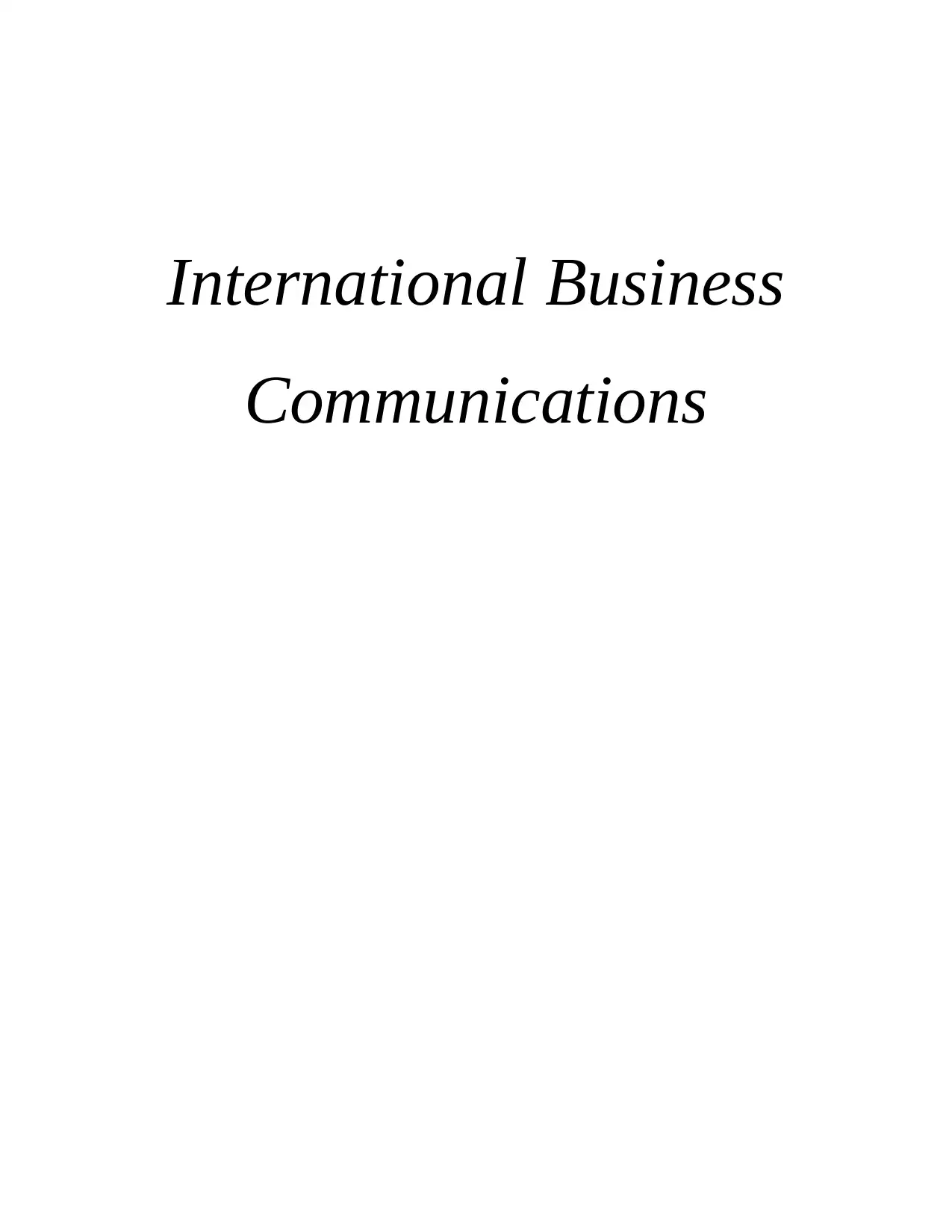
International Business
Communications
Communications
Paraphrase This Document
Need a fresh take? Get an instant paraphrase of this document with our AI Paraphraser
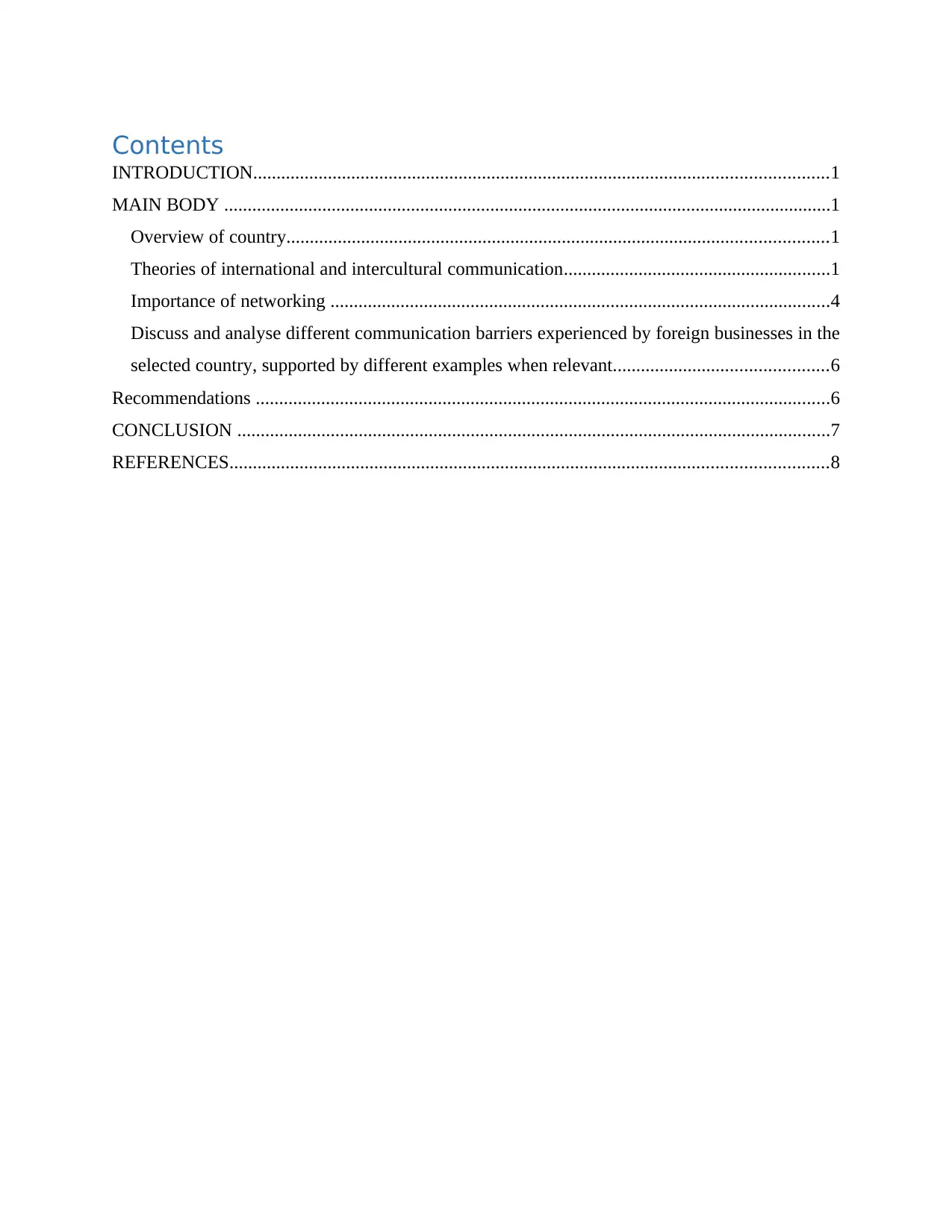
Contents
INTRODUCTION...........................................................................................................................1
MAIN BODY ..................................................................................................................................1
Overview of country....................................................................................................................1
Theories of international and intercultural communication.........................................................1
Importance of networking ...........................................................................................................4
Discuss and analyse different communication barriers experienced by foreign businesses in the
selected country, supported by different examples when relevant..............................................6
Recommendations ...........................................................................................................................6
CONCLUSION ...............................................................................................................................7
REFERENCES................................................................................................................................8
INTRODUCTION...........................................................................................................................1
MAIN BODY ..................................................................................................................................1
Overview of country....................................................................................................................1
Theories of international and intercultural communication.........................................................1
Importance of networking ...........................................................................................................4
Discuss and analyse different communication barriers experienced by foreign businesses in the
selected country, supported by different examples when relevant..............................................6
Recommendations ...........................................................................................................................6
CONCLUSION ...............................................................................................................................7
REFERENCES................................................................................................................................8

⊘ This is a preview!⊘
Do you want full access?
Subscribe today to unlock all pages.

Trusted by 1+ million students worldwide
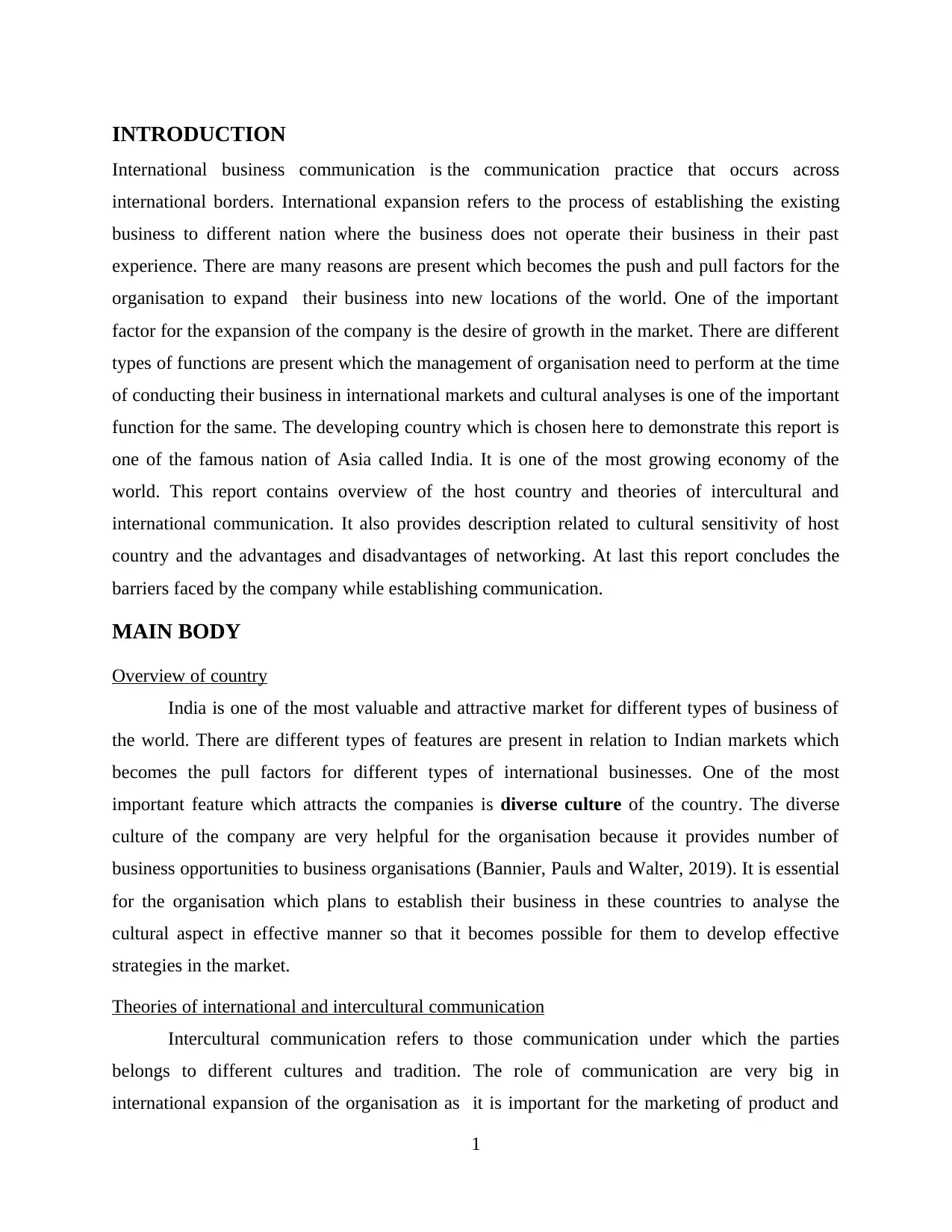
INTRODUCTION
International business communication is the communication practice that occurs across
international borders. International expansion refers to the process of establishing the existing
business to different nation where the business does not operate their business in their past
experience. There are many reasons are present which becomes the push and pull factors for the
organisation to expand their business into new locations of the world. One of the important
factor for the expansion of the company is the desire of growth in the market. There are different
types of functions are present which the management of organisation need to perform at the time
of conducting their business in international markets and cultural analyses is one of the important
function for the same. The developing country which is chosen here to demonstrate this report is
one of the famous nation of Asia called India. It is one of the most growing economy of the
world. This report contains overview of the host country and theories of intercultural and
international communication. It also provides description related to cultural sensitivity of host
country and the advantages and disadvantages of networking. At last this report concludes the
barriers faced by the company while establishing communication.
MAIN BODY
Overview of country
India is one of the most valuable and attractive market for different types of business of
the world. There are different types of features are present in relation to Indian markets which
becomes the pull factors for different types of international businesses. One of the most
important feature which attracts the companies is diverse culture of the country. The diverse
culture of the company are very helpful for the organisation because it provides number of
business opportunities to business organisations (Bannier, Pauls and Walter, 2019). It is essential
for the organisation which plans to establish their business in these countries to analyse the
cultural aspect in effective manner so that it becomes possible for them to develop effective
strategies in the market.
Theories of international and intercultural communication
Intercultural communication refers to those communication under which the parties
belongs to different cultures and tradition. The role of communication are very big in
international expansion of the organisation as it is important for the marketing of product and
1
International business communication is the communication practice that occurs across
international borders. International expansion refers to the process of establishing the existing
business to different nation where the business does not operate their business in their past
experience. There are many reasons are present which becomes the push and pull factors for the
organisation to expand their business into new locations of the world. One of the important
factor for the expansion of the company is the desire of growth in the market. There are different
types of functions are present which the management of organisation need to perform at the time
of conducting their business in international markets and cultural analyses is one of the important
function for the same. The developing country which is chosen here to demonstrate this report is
one of the famous nation of Asia called India. It is one of the most growing economy of the
world. This report contains overview of the host country and theories of intercultural and
international communication. It also provides description related to cultural sensitivity of host
country and the advantages and disadvantages of networking. At last this report concludes the
barriers faced by the company while establishing communication.
MAIN BODY
Overview of country
India is one of the most valuable and attractive market for different types of business of
the world. There are different types of features are present in relation to Indian markets which
becomes the pull factors for different types of international businesses. One of the most
important feature which attracts the companies is diverse culture of the country. The diverse
culture of the company are very helpful for the organisation because it provides number of
business opportunities to business organisations (Bannier, Pauls and Walter, 2019). It is essential
for the organisation which plans to establish their business in these countries to analyse the
cultural aspect in effective manner so that it becomes possible for them to develop effective
strategies in the market.
Theories of international and intercultural communication
Intercultural communication refers to those communication under which the parties
belongs to different cultures and tradition. The role of communication are very big in
international expansion of the organisation as it is important for the marketing of product and
1
Paraphrase This Document
Need a fresh take? Get an instant paraphrase of this document with our AI Paraphraser
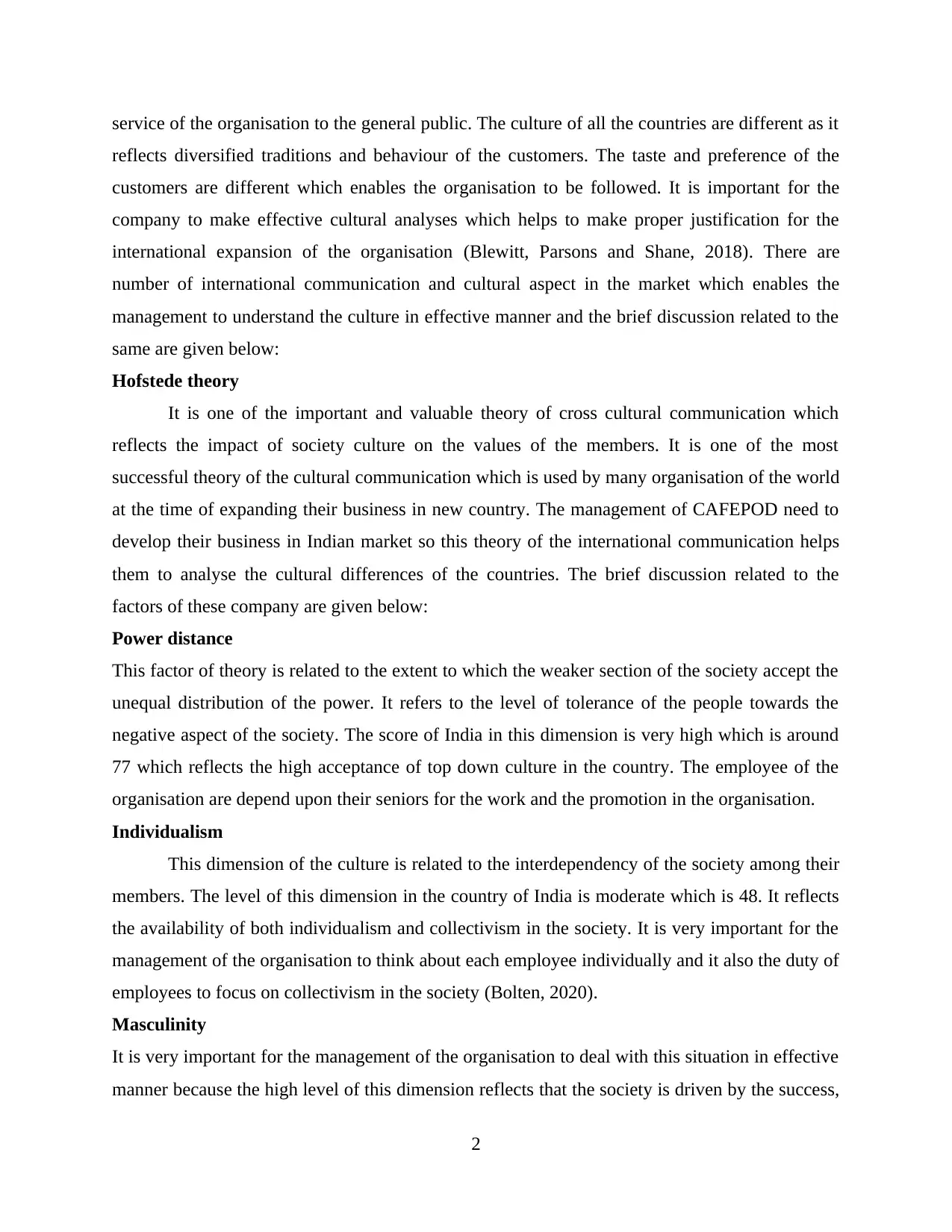
service of the organisation to the general public. The culture of all the countries are different as it
reflects diversified traditions and behaviour of the customers. The taste and preference of the
customers are different which enables the organisation to be followed. It is important for the
company to make effective cultural analyses which helps to make proper justification for the
international expansion of the organisation (Blewitt, Parsons and Shane, 2018). There are
number of international communication and cultural aspect in the market which enables the
management to understand the culture in effective manner and the brief discussion related to the
same are given below:
Hofstede theory
It is one of the important and valuable theory of cross cultural communication which
reflects the impact of society culture on the values of the members. It is one of the most
successful theory of the cultural communication which is used by many organisation of the world
at the time of expanding their business in new country. The management of CAFEPOD need to
develop their business in Indian market so this theory of the international communication helps
them to analyse the cultural differences of the countries. The brief discussion related to the
factors of these company are given below:
Power distance
This factor of theory is related to the extent to which the weaker section of the society accept the
unequal distribution of the power. It refers to the level of tolerance of the people towards the
negative aspect of the society. The score of India in this dimension is very high which is around
77 which reflects the high acceptance of top down culture in the country. The employee of the
organisation are depend upon their seniors for the work and the promotion in the organisation.
Individualism
This dimension of the culture is related to the interdependency of the society among their
members. The level of this dimension in the country of India is moderate which is 48. It reflects
the availability of both individualism and collectivism in the society. It is very important for the
management of the organisation to think about each employee individually and it also the duty of
employees to focus on collectivism in the society (Bolten, 2020).
Masculinity
It is very important for the management of the organisation to deal with this situation in effective
manner because the high level of this dimension reflects that the society is driven by the success,
2
reflects diversified traditions and behaviour of the customers. The taste and preference of the
customers are different which enables the organisation to be followed. It is important for the
company to make effective cultural analyses which helps to make proper justification for the
international expansion of the organisation (Blewitt, Parsons and Shane, 2018). There are
number of international communication and cultural aspect in the market which enables the
management to understand the culture in effective manner and the brief discussion related to the
same are given below:
Hofstede theory
It is one of the important and valuable theory of cross cultural communication which
reflects the impact of society culture on the values of the members. It is one of the most
successful theory of the cultural communication which is used by many organisation of the world
at the time of expanding their business in new country. The management of CAFEPOD need to
develop their business in Indian market so this theory of the international communication helps
them to analyse the cultural differences of the countries. The brief discussion related to the
factors of these company are given below:
Power distance
This factor of theory is related to the extent to which the weaker section of the society accept the
unequal distribution of the power. It refers to the level of tolerance of the people towards the
negative aspect of the society. The score of India in this dimension is very high which is around
77 which reflects the high acceptance of top down culture in the country. The employee of the
organisation are depend upon their seniors for the work and the promotion in the organisation.
Individualism
This dimension of the culture is related to the interdependency of the society among their
members. The level of this dimension in the country of India is moderate which is 48. It reflects
the availability of both individualism and collectivism in the society. It is very important for the
management of the organisation to think about each employee individually and it also the duty of
employees to focus on collectivism in the society (Bolten, 2020).
Masculinity
It is very important for the management of the organisation to deal with this situation in effective
manner because the high level of this dimension reflects that the society is driven by the success,
2
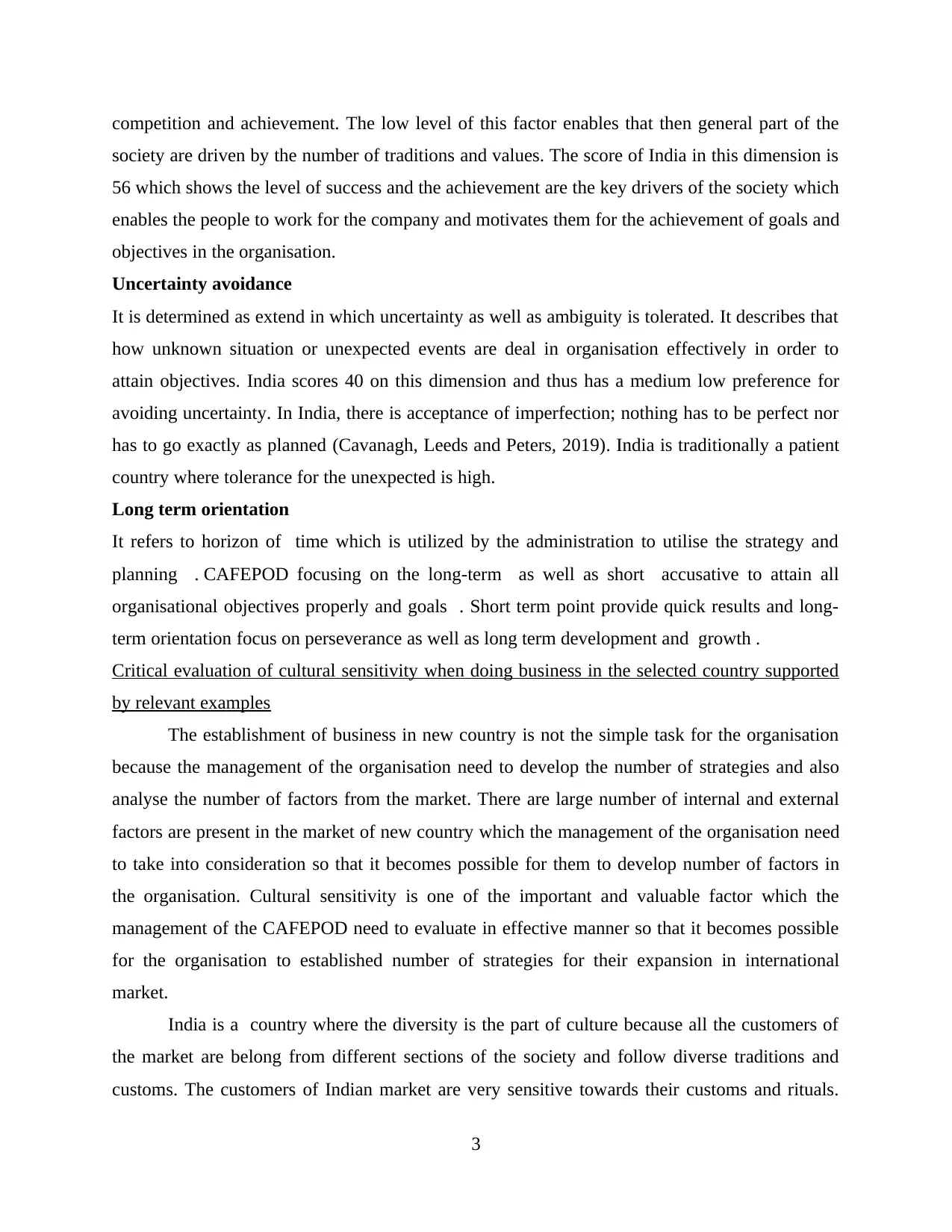
competition and achievement. The low level of this factor enables that then general part of the
society are driven by the number of traditions and values. The score of India in this dimension is
56 which shows the level of success and the achievement are the key drivers of the society which
enables the people to work for the company and motivates them for the achievement of goals and
objectives in the organisation.
Uncertainty avoidance
It is determined as extend in which uncertainty as well as ambiguity is tolerated. It describes that
how unknown situation or unexpected events are deal in organisation effectively in order to
attain objectives. India scores 40 on this dimension and thus has a medium low preference for
avoiding uncertainty. In India, there is acceptance of imperfection; nothing has to be perfect nor
has to go exactly as planned (Cavanagh, Leeds and Peters, 2019). India is traditionally a patient
country where tolerance for the unexpected is high.
Long term orientation
It refers to horizon of time which is utilized by the administration to utilise the strategy and
planning . CAFEPOD focusing on the long-term as well as short accusative to attain all
organisational objectives properly and goals . Short term point provide quick results and long-
term orientation focus on perseverance as well as long term development and growth .
Critical evaluation of cultural sensitivity when doing business in the selected country supported
by relevant examples
The establishment of business in new country is not the simple task for the organisation
because the management of the organisation need to develop the number of strategies and also
analyse the number of factors from the market. There are large number of internal and external
factors are present in the market of new country which the management of the organisation need
to take into consideration so that it becomes possible for them to develop number of factors in
the organisation. Cultural sensitivity is one of the important and valuable factor which the
management of the CAFEPOD need to evaluate in effective manner so that it becomes possible
for the organisation to established number of strategies for their expansion in international
market.
India is a country where the diversity is the part of culture because all the customers of
the market are belong from different sections of the society and follow diverse traditions and
customs. The customers of Indian market are very sensitive towards their customs and rituals.
3
society are driven by the number of traditions and values. The score of India in this dimension is
56 which shows the level of success and the achievement are the key drivers of the society which
enables the people to work for the company and motivates them for the achievement of goals and
objectives in the organisation.
Uncertainty avoidance
It is determined as extend in which uncertainty as well as ambiguity is tolerated. It describes that
how unknown situation or unexpected events are deal in organisation effectively in order to
attain objectives. India scores 40 on this dimension and thus has a medium low preference for
avoiding uncertainty. In India, there is acceptance of imperfection; nothing has to be perfect nor
has to go exactly as planned (Cavanagh, Leeds and Peters, 2019). India is traditionally a patient
country where tolerance for the unexpected is high.
Long term orientation
It refers to horizon of time which is utilized by the administration to utilise the strategy and
planning . CAFEPOD focusing on the long-term as well as short accusative to attain all
organisational objectives properly and goals . Short term point provide quick results and long-
term orientation focus on perseverance as well as long term development and growth .
Critical evaluation of cultural sensitivity when doing business in the selected country supported
by relevant examples
The establishment of business in new country is not the simple task for the organisation
because the management of the organisation need to develop the number of strategies and also
analyse the number of factors from the market. There are large number of internal and external
factors are present in the market of new country which the management of the organisation need
to take into consideration so that it becomes possible for them to develop number of factors in
the organisation. Cultural sensitivity is one of the important and valuable factor which the
management of the CAFEPOD need to evaluate in effective manner so that it becomes possible
for the organisation to established number of strategies for their expansion in international
market.
India is a country where the diversity is the part of culture because all the customers of
the market are belong from different sections of the society and follow diverse traditions and
customs. The customers of Indian market are very sensitive towards their customs and rituals.
3
⊘ This is a preview!⊘
Do you want full access?
Subscribe today to unlock all pages.

Trusted by 1+ million students worldwide
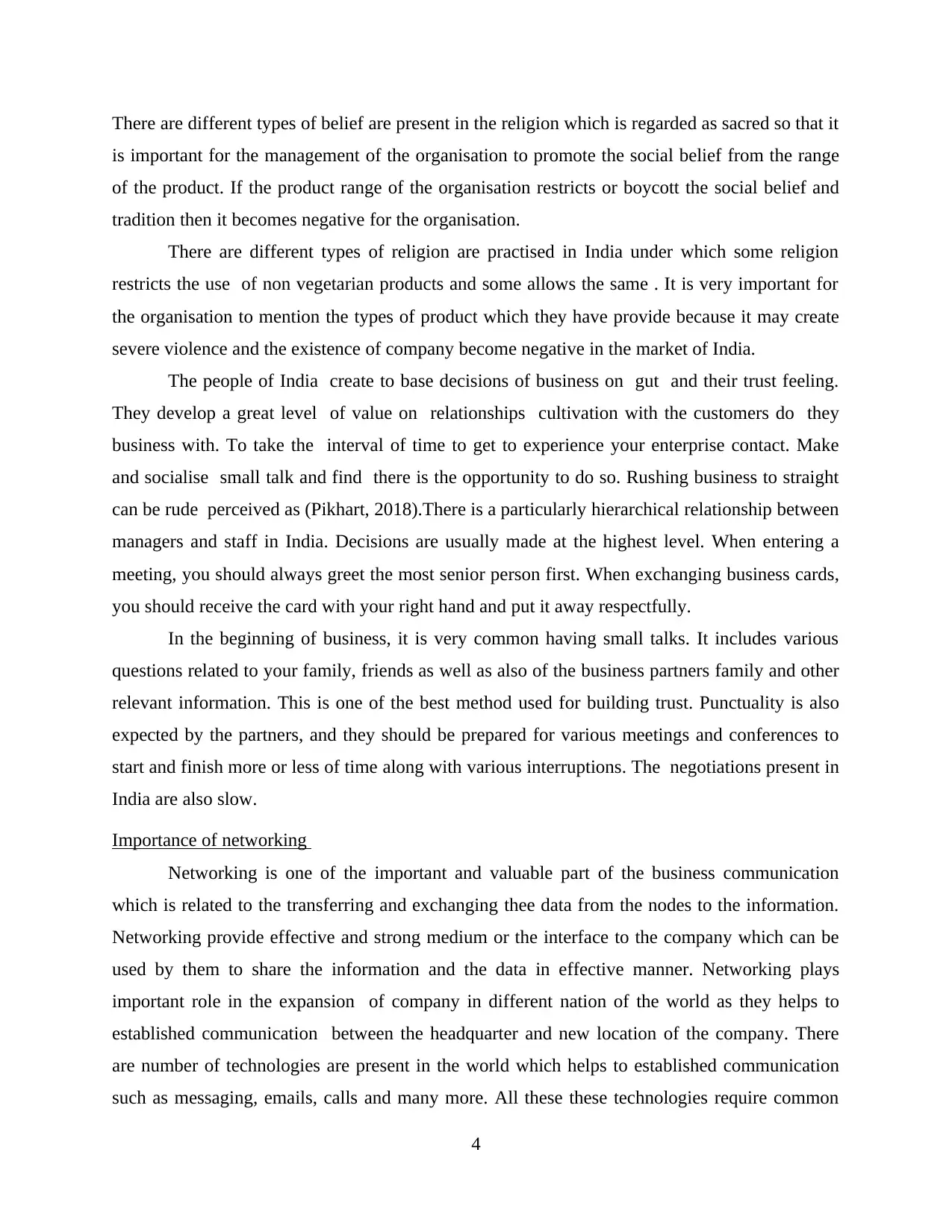
There are different types of belief are present in the religion which is regarded as sacred so that it
is important for the management of the organisation to promote the social belief from the range
of the product. If the product range of the organisation restricts or boycott the social belief and
tradition then it becomes negative for the organisation.
There are different types of religion are practised in India under which some religion
restricts the use of non vegetarian products and some allows the same . It is very important for
the organisation to mention the types of product which they have provide because it may create
severe violence and the existence of company become negative in the market of India.
The people of India create to base decisions of business on gut and their trust feeling.
They develop a great level of value on relationships cultivation with the customers do they
business with. To take the interval of time to get to experience your enterprise contact. Make
and socialise small talk and find there is the opportunity to do so. Rushing business to straight
can be rude perceived as (Pikhart, 2018).There is a particularly hierarchical relationship between
managers and staff in India. Decisions are usually made at the highest level. When entering a
meeting, you should always greet the most senior person first. When exchanging business cards,
you should receive the card with your right hand and put it away respectfully.
In the beginning of business, it is very common having small talks. It includes various
questions related to your family, friends as well as also of the business partners family and other
relevant information. This is one of the best method used for building trust. Punctuality is also
expected by the partners, and they should be prepared for various meetings and conferences to
start and finish more or less of time along with various interruptions. The negotiations present in
India are also slow.
Importance of networking
Networking is one of the important and valuable part of the business communication
which is related to the transferring and exchanging thee data from the nodes to the information.
Networking provide effective and strong medium or the interface to the company which can be
used by them to share the information and the data in effective manner. Networking plays
important role in the expansion of company in different nation of the world as they helps to
established communication between the headquarter and new location of the company. There
are number of technologies are present in the world which helps to established communication
such as messaging, emails, calls and many more. All these these technologies require common
4
is important for the management of the organisation to promote the social belief from the range
of the product. If the product range of the organisation restricts or boycott the social belief and
tradition then it becomes negative for the organisation.
There are different types of religion are practised in India under which some religion
restricts the use of non vegetarian products and some allows the same . It is very important for
the organisation to mention the types of product which they have provide because it may create
severe violence and the existence of company become negative in the market of India.
The people of India create to base decisions of business on gut and their trust feeling.
They develop a great level of value on relationships cultivation with the customers do they
business with. To take the interval of time to get to experience your enterprise contact. Make
and socialise small talk and find there is the opportunity to do so. Rushing business to straight
can be rude perceived as (Pikhart, 2018).There is a particularly hierarchical relationship between
managers and staff in India. Decisions are usually made at the highest level. When entering a
meeting, you should always greet the most senior person first. When exchanging business cards,
you should receive the card with your right hand and put it away respectfully.
In the beginning of business, it is very common having small talks. It includes various
questions related to your family, friends as well as also of the business partners family and other
relevant information. This is one of the best method used for building trust. Punctuality is also
expected by the partners, and they should be prepared for various meetings and conferences to
start and finish more or less of time along with various interruptions. The negotiations present in
India are also slow.
Importance of networking
Networking is one of the important and valuable part of the business communication
which is related to the transferring and exchanging thee data from the nodes to the information.
Networking provide effective and strong medium or the interface to the company which can be
used by them to share the information and the data in effective manner. Networking plays
important role in the expansion of company in different nation of the world as they helps to
established communication between the headquarter and new location of the company. There
are number of technologies are present in the world which helps to established communication
such as messaging, emails, calls and many more. All these these technologies require common
4
Paraphrase This Document
Need a fresh take? Get an instant paraphrase of this document with our AI Paraphraser
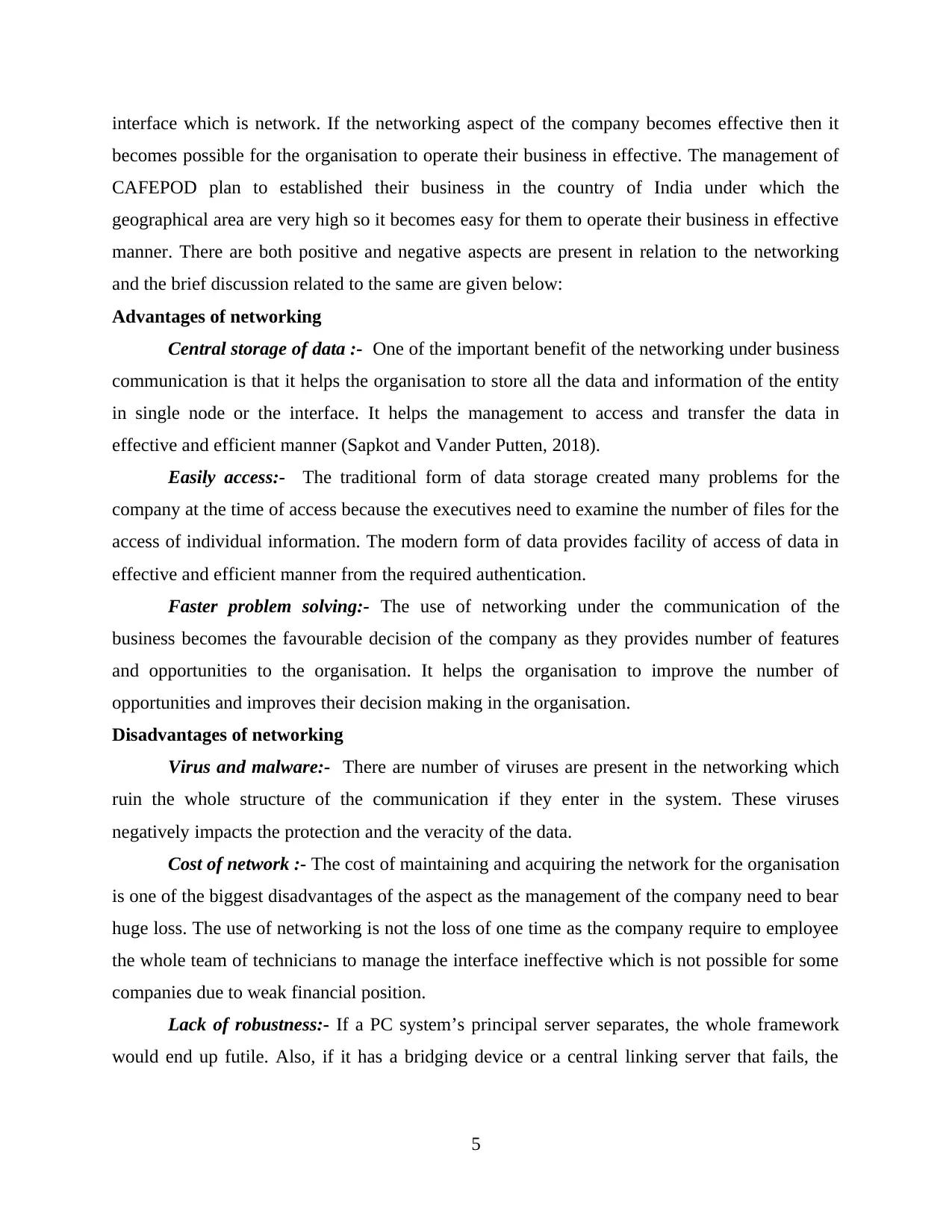
interface which is network. If the networking aspect of the company becomes effective then it
becomes possible for the organisation to operate their business in effective. The management of
CAFEPOD plan to established their business in the country of India under which the
geographical area are very high so it becomes easy for them to operate their business in effective
manner. There are both positive and negative aspects are present in relation to the networking
and the brief discussion related to the same are given below:
Advantages of networking
Central storage of data :- One of the important benefit of the networking under business
communication is that it helps the organisation to store all the data and information of the entity
in single node or the interface. It helps the management to access and transfer the data in
effective and efficient manner (Sapkot and Vander Putten, 2018).
Easily access:- The traditional form of data storage created many problems for the
company at the time of access because the executives need to examine the number of files for the
access of individual information. The modern form of data provides facility of access of data in
effective and efficient manner from the required authentication.
Faster problem solving:- The use of networking under the communication of the
business becomes the favourable decision of the company as they provides number of features
and opportunities to the organisation. It helps the organisation to improve the number of
opportunities and improves their decision making in the organisation.
Disadvantages of networking
Virus and malware:- There are number of viruses are present in the networking which
ruin the whole structure of the communication if they enter in the system. These viruses
negatively impacts the protection and the veracity of the data.
Cost of network :- The cost of maintaining and acquiring the network for the organisation
is one of the biggest disadvantages of the aspect as the management of the company need to bear
huge loss. The use of networking is not the loss of one time as the company require to employee
the whole team of technicians to manage the interface ineffective which is not possible for some
companies due to weak financial position.
Lack of robustness:- If a PC system’s principal server separates, the whole framework
would end up futile. Also, if it has a bridging device or a central linking server that fails, the
5
becomes possible for the organisation to operate their business in effective. The management of
CAFEPOD plan to established their business in the country of India under which the
geographical area are very high so it becomes easy for them to operate their business in effective
manner. There are both positive and negative aspects are present in relation to the networking
and the brief discussion related to the same are given below:
Advantages of networking
Central storage of data :- One of the important benefit of the networking under business
communication is that it helps the organisation to store all the data and information of the entity
in single node or the interface. It helps the management to access and transfer the data in
effective and efficient manner (Sapkot and Vander Putten, 2018).
Easily access:- The traditional form of data storage created many problems for the
company at the time of access because the executives need to examine the number of files for the
access of individual information. The modern form of data provides facility of access of data in
effective and efficient manner from the required authentication.
Faster problem solving:- The use of networking under the communication of the
business becomes the favourable decision of the company as they provides number of features
and opportunities to the organisation. It helps the organisation to improve the number of
opportunities and improves their decision making in the organisation.
Disadvantages of networking
Virus and malware:- There are number of viruses are present in the networking which
ruin the whole structure of the communication if they enter in the system. These viruses
negatively impacts the protection and the veracity of the data.
Cost of network :- The cost of maintaining and acquiring the network for the organisation
is one of the biggest disadvantages of the aspect as the management of the company need to bear
huge loss. The use of networking is not the loss of one time as the company require to employee
the whole team of technicians to manage the interface ineffective which is not possible for some
companies due to weak financial position.
Lack of robustness:- If a PC system’s principal server separates, the whole framework
would end up futile. Also, if it has a bridging device or a central linking server that fails, the
5
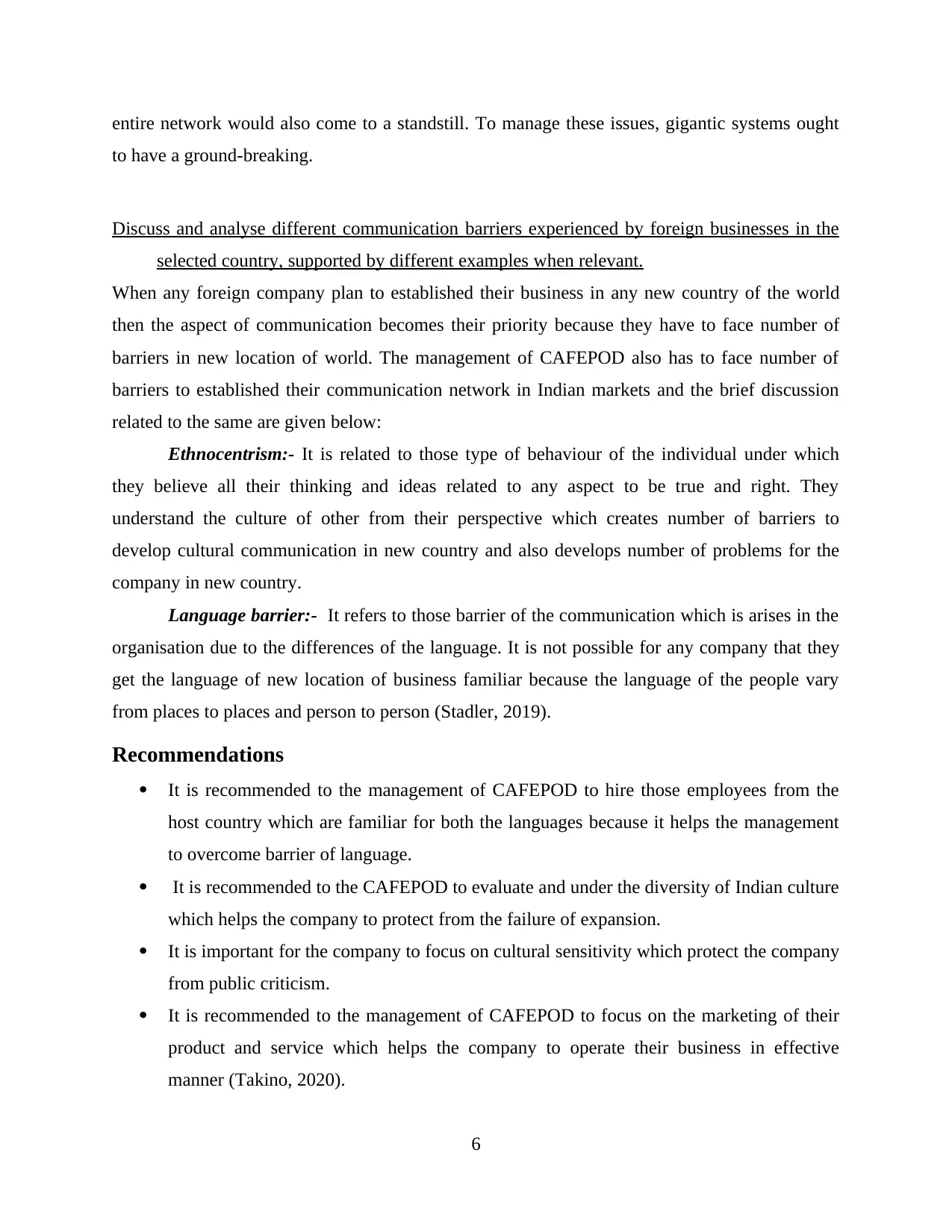
entire network would also come to a standstill. To manage these issues, gigantic systems ought
to have a ground-breaking.
Discuss and analyse different communication barriers experienced by foreign businesses in the
selected country, supported by different examples when relevant.
When any foreign company plan to established their business in any new country of the world
then the aspect of communication becomes their priority because they have to face number of
barriers in new location of world. The management of CAFEPOD also has to face number of
barriers to established their communication network in Indian markets and the brief discussion
related to the same are given below:
Ethnocentrism:- It is related to those type of behaviour of the individual under which
they believe all their thinking and ideas related to any aspect to be true and right. They
understand the culture of other from their perspective which creates number of barriers to
develop cultural communication in new country and also develops number of problems for the
company in new country.
Language barrier:- It refers to those barrier of the communication which is arises in the
organisation due to the differences of the language. It is not possible for any company that they
get the language of new location of business familiar because the language of the people vary
from places to places and person to person (Stadler, 2019).
Recommendations
It is recommended to the management of CAFEPOD to hire those employees from the
host country which are familiar for both the languages because it helps the management
to overcome barrier of language.
It is recommended to the CAFEPOD to evaluate and under the diversity of Indian culture
which helps the company to protect from the failure of expansion.
It is important for the company to focus on cultural sensitivity which protect the company
from public criticism.
It is recommended to the management of CAFEPOD to focus on the marketing of their
product and service which helps the company to operate their business in effective
manner (Takino, 2020).
6
to have a ground-breaking.
Discuss and analyse different communication barriers experienced by foreign businesses in the
selected country, supported by different examples when relevant.
When any foreign company plan to established their business in any new country of the world
then the aspect of communication becomes their priority because they have to face number of
barriers in new location of world. The management of CAFEPOD also has to face number of
barriers to established their communication network in Indian markets and the brief discussion
related to the same are given below:
Ethnocentrism:- It is related to those type of behaviour of the individual under which
they believe all their thinking and ideas related to any aspect to be true and right. They
understand the culture of other from their perspective which creates number of barriers to
develop cultural communication in new country and also develops number of problems for the
company in new country.
Language barrier:- It refers to those barrier of the communication which is arises in the
organisation due to the differences of the language. It is not possible for any company that they
get the language of new location of business familiar because the language of the people vary
from places to places and person to person (Stadler, 2019).
Recommendations
It is recommended to the management of CAFEPOD to hire those employees from the
host country which are familiar for both the languages because it helps the management
to overcome barrier of language.
It is recommended to the CAFEPOD to evaluate and under the diversity of Indian culture
which helps the company to protect from the failure of expansion.
It is important for the company to focus on cultural sensitivity which protect the company
from public criticism.
It is recommended to the management of CAFEPOD to focus on the marketing of their
product and service which helps the company to operate their business in effective
manner (Takino, 2020).
6
⊘ This is a preview!⊘
Do you want full access?
Subscribe today to unlock all pages.

Trusted by 1+ million students worldwide
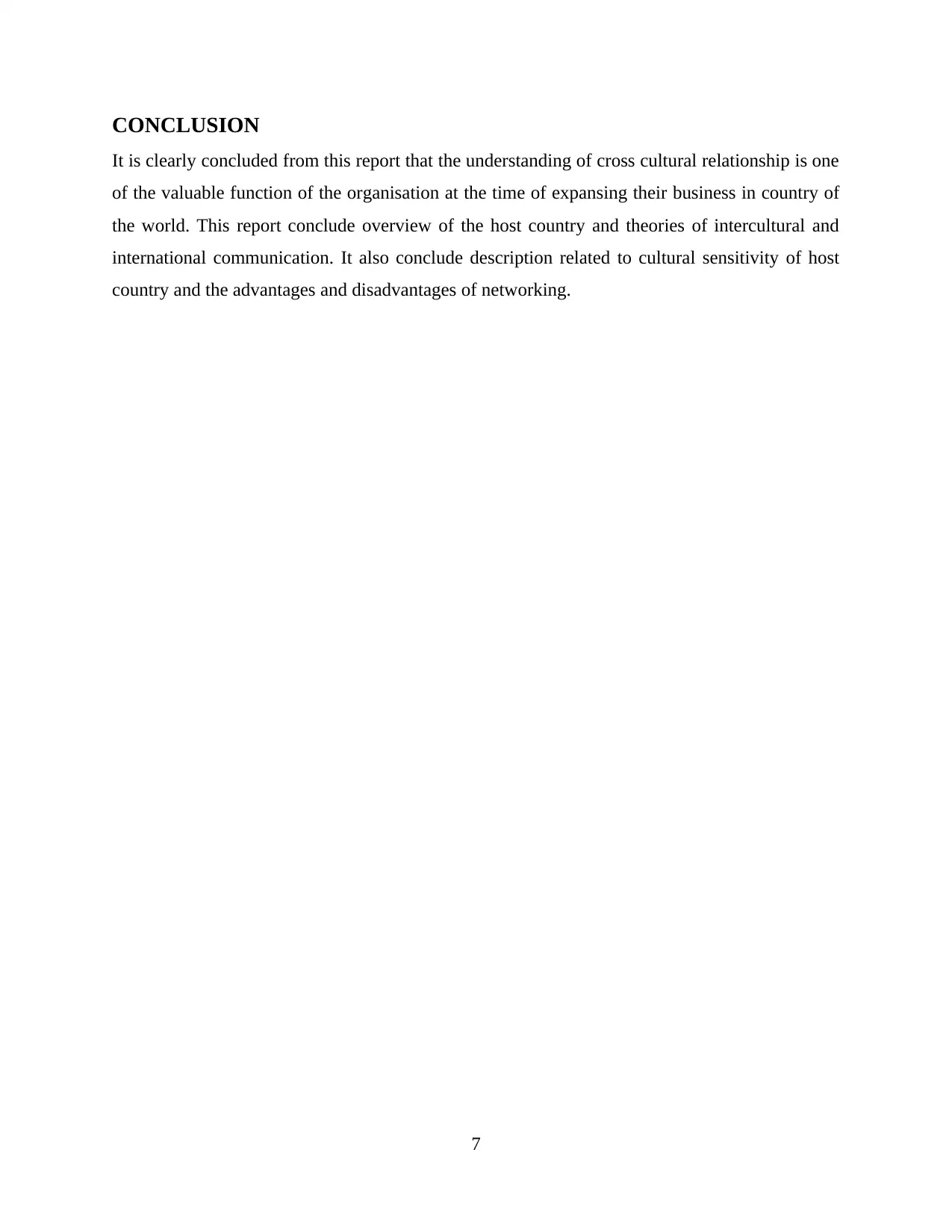
CONCLUSION
It is clearly concluded from this report that the understanding of cross cultural relationship is one
of the valuable function of the organisation at the time of expansing their business in country of
the world. This report conclude overview of the host country and theories of intercultural and
international communication. It also conclude description related to cultural sensitivity of host
country and the advantages and disadvantages of networking.
7
It is clearly concluded from this report that the understanding of cross cultural relationship is one
of the valuable function of the organisation at the time of expansing their business in country of
the world. This report conclude overview of the host country and theories of intercultural and
international communication. It also conclude description related to cultural sensitivity of host
country and the advantages and disadvantages of networking.
7
Paraphrase This Document
Need a fresh take? Get an instant paraphrase of this document with our AI Paraphraser
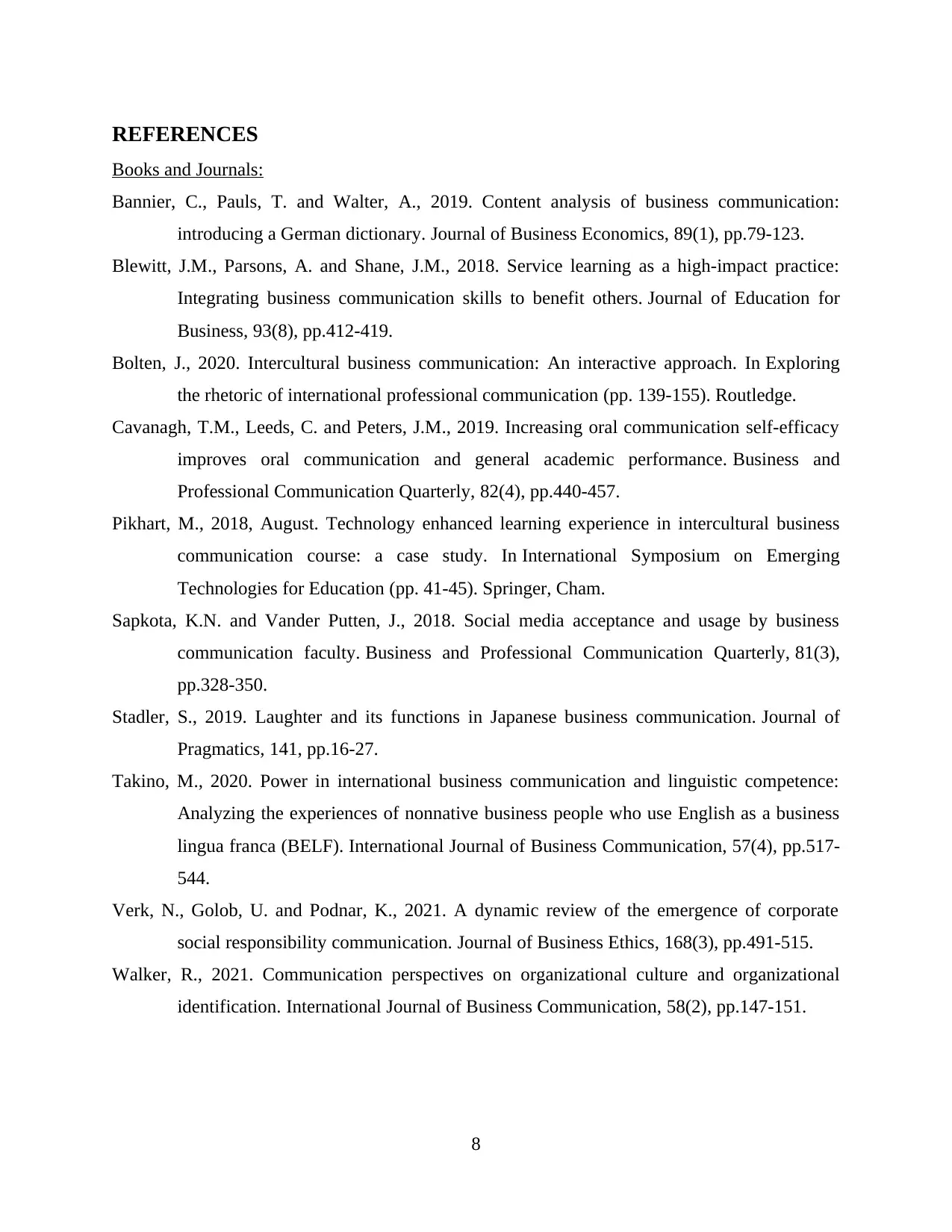
REFERENCES
Books and Journals:
Bannier, C., Pauls, T. and Walter, A., 2019. Content analysis of business communication:
introducing a German dictionary. Journal of Business Economics, 89(1), pp.79-123.
Blewitt, J.M., Parsons, A. and Shane, J.M., 2018. Service learning as a high-impact practice:
Integrating business communication skills to benefit others. Journal of Education for
Business, 93(8), pp.412-419.
Bolten, J., 2020. Intercultural business communication: An interactive approach. In Exploring
the rhetoric of international professional communication (pp. 139-155). Routledge.
Cavanagh, T.M., Leeds, C. and Peters, J.M., 2019. Increasing oral communication self-efficacy
improves oral communication and general academic performance. Business and
Professional Communication Quarterly, 82(4), pp.440-457.
Pikhart, M., 2018, August. Technology enhanced learning experience in intercultural business
communication course: a case study. In International Symposium on Emerging
Technologies for Education (pp. 41-45). Springer, Cham.
Sapkota, K.N. and Vander Putten, J., 2018. Social media acceptance and usage by business
communication faculty. Business and Professional Communication Quarterly, 81(3),
pp.328-350.
Stadler, S., 2019. Laughter and its functions in Japanese business communication. Journal of
Pragmatics, 141, pp.16-27.
Takino, M., 2020. Power in international business communication and linguistic competence:
Analyzing the experiences of nonnative business people who use English as a business
lingua franca (BELF). International Journal of Business Communication, 57(4), pp.517-
544.
Verk, N., Golob, U. and Podnar, K., 2021. A dynamic review of the emergence of corporate
social responsibility communication. Journal of Business Ethics, 168(3), pp.491-515.
Walker, R., 2021. Communication perspectives on organizational culture and organizational
identification. International Journal of Business Communication, 58(2), pp.147-151.
8
Books and Journals:
Bannier, C., Pauls, T. and Walter, A., 2019. Content analysis of business communication:
introducing a German dictionary. Journal of Business Economics, 89(1), pp.79-123.
Blewitt, J.M., Parsons, A. and Shane, J.M., 2018. Service learning as a high-impact practice:
Integrating business communication skills to benefit others. Journal of Education for
Business, 93(8), pp.412-419.
Bolten, J., 2020. Intercultural business communication: An interactive approach. In Exploring
the rhetoric of international professional communication (pp. 139-155). Routledge.
Cavanagh, T.M., Leeds, C. and Peters, J.M., 2019. Increasing oral communication self-efficacy
improves oral communication and general academic performance. Business and
Professional Communication Quarterly, 82(4), pp.440-457.
Pikhart, M., 2018, August. Technology enhanced learning experience in intercultural business
communication course: a case study. In International Symposium on Emerging
Technologies for Education (pp. 41-45). Springer, Cham.
Sapkota, K.N. and Vander Putten, J., 2018. Social media acceptance and usage by business
communication faculty. Business and Professional Communication Quarterly, 81(3),
pp.328-350.
Stadler, S., 2019. Laughter and its functions in Japanese business communication. Journal of
Pragmatics, 141, pp.16-27.
Takino, M., 2020. Power in international business communication and linguistic competence:
Analyzing the experiences of nonnative business people who use English as a business
lingua franca (BELF). International Journal of Business Communication, 57(4), pp.517-
544.
Verk, N., Golob, U. and Podnar, K., 2021. A dynamic review of the emergence of corporate
social responsibility communication. Journal of Business Ethics, 168(3), pp.491-515.
Walker, R., 2021. Communication perspectives on organizational culture and organizational
identification. International Journal of Business Communication, 58(2), pp.147-151.
8

9
⊘ This is a preview!⊘
Do you want full access?
Subscribe today to unlock all pages.

Trusted by 1+ million students worldwide
1 out of 12
Related Documents
Your All-in-One AI-Powered Toolkit for Academic Success.
+13062052269
info@desklib.com
Available 24*7 on WhatsApp / Email
![[object Object]](/_next/static/media/star-bottom.7253800d.svg)
Unlock your academic potential
Copyright © 2020–2026 A2Z Services. All Rights Reserved. Developed and managed by ZUCOL.



